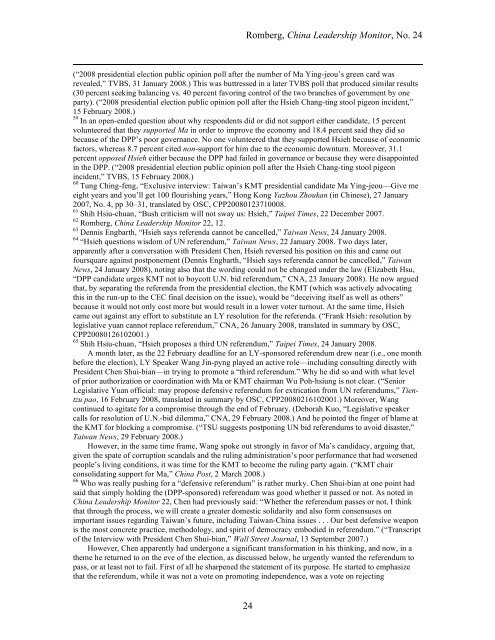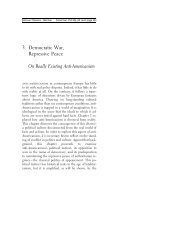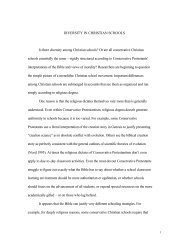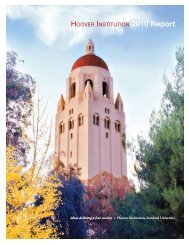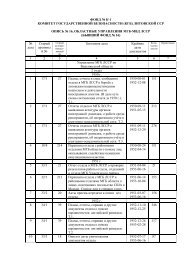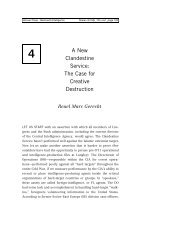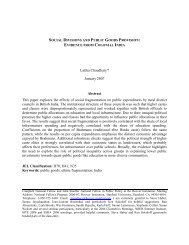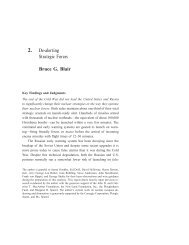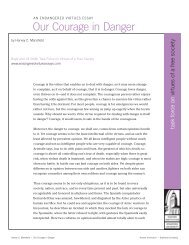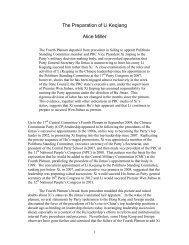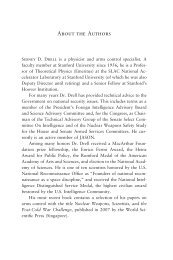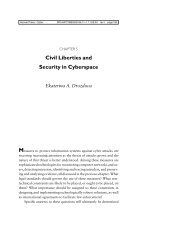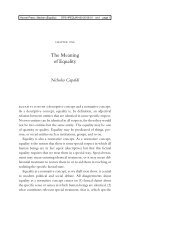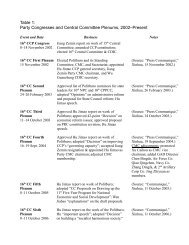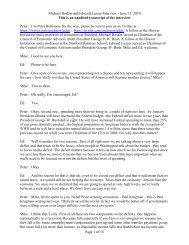Taiwan Elections: Foundation for the Future - Hoover Institution
Taiwan Elections: Foundation for the Future - Hoover Institution
Taiwan Elections: Foundation for the Future - Hoover Institution
Create successful ePaper yourself
Turn your PDF publications into a flip-book with our unique Google optimized e-Paper software.
Romberg, China Leadership Monitor, No. 24<br />
(“2008 presidential election public opinion poll after <strong>the</strong> number of Ma Ying-jeou’s green card was<br />
revealed,” TVBS, 31 January 2008.) This was buttressed in a later TVBS poll that produced similar results<br />
(30 percent seeking balancing vs. 40 percent favoring control of <strong>the</strong> two branches of government by one<br />
party). (“2008 presidential election public opinion poll after <strong>the</strong> Hsieh Chang-ting stool pigeon incident,”<br />
15 February 2008.)<br />
59<br />
In an open-ended question about why respondents did or did not support ei<strong>the</strong>r candidate, 15 percent<br />
volunteered that <strong>the</strong>y supported Ma in order to improve <strong>the</strong> economy and 18.4 percent said <strong>the</strong>y did so<br />
because of <strong>the</strong> DPP’s poor governance. No one volunteered that <strong>the</strong>y supported Hsieh because of economic<br />
factors, whereas 8.7 percent cited non-support <strong>for</strong> him due to <strong>the</strong> economic downturn. Moreover, 31.1<br />
percent opposed Hsieh ei<strong>the</strong>r because <strong>the</strong> DPP had failed in governance or because <strong>the</strong>y were disappointed<br />
in <strong>the</strong> DPP. (“2008 presidential election public opinion poll after <strong>the</strong> Hsieh Chang-ting stool pigeon<br />
incident,” TVBS, 15 February 2008.)<br />
60<br />
Tung Ching-feng, “Exclusive interview: <strong>Taiwan</strong>’s KMT presidential candidate Ma Ying-jeou—Give me<br />
eight years and you’ll get 100 flourishing years,” Hong Kong Yazhou Zhoukan (in Chinese), 27 January<br />
2007, No. 4, pp 30–31, translated by OSC, CPP20080123710008.<br />
61<br />
Shih Hsiu-chuan, “Bush criticism will not sway us: Hsieh,” Taipei Times, 22 December 2007.<br />
62<br />
Romberg, China Leadership Monitor 22, 12.<br />
63<br />
Dennis Engbarth, “Hsieh says referenda cannot be cancelled,” <strong>Taiwan</strong> News, 24 January 2008.<br />
64<br />
“Hsieh questions wisdom of UN referendum,” <strong>Taiwan</strong> News, 22 January 2008. Two days later,<br />
apparently after a conversation with President Chen, Hsieh reversed his position on this and came out<br />
foursquare against postponement (Dennis Engbarth, “Hsieh says referenda cannot be cancelled,” <strong>Taiwan</strong><br />
News, 24 January 2008), noting also that <strong>the</strong> wording could not be changed under <strong>the</strong> law (Elizabeth Hsu,<br />
“DPP candidate urges KMT not to boycott U.N. bid referendum,” CNA, 23 January 2008). He now argued<br />
that, by separating <strong>the</strong> referenda from <strong>the</strong> presidential election, <strong>the</strong> KMT (which was actively advocating<br />
this in <strong>the</strong> run-up to <strong>the</strong> CEC final decision on <strong>the</strong> issue), would be “deceiving itself as well as o<strong>the</strong>rs”<br />
because it would not only cost more but would result in a lower voter turnout. At <strong>the</strong> same time, Hsieh<br />
came out against any ef<strong>for</strong>t to substitute an LY resolution <strong>for</strong> <strong>the</strong> referenda. (“Frank Hsieh: resolution by<br />
legislative yuan cannot replace referendum,” CNA, 26 January 2008, translated in summary by OSC,<br />
CPP20080126102001.)<br />
65<br />
Shih Hsiu-chuan, “Hsieh proposes a third UN referendum,” Taipei Times, 24 January 2008.<br />
A month later, as <strong>the</strong> 22 February deadline <strong>for</strong> an LY-sponsored referendum drew near (i.e., one month<br />
be<strong>for</strong>e <strong>the</strong> election), LY Speaker Wang Jin-pyng played an active role—including consulting directly with<br />
President Chen Shui-bian—in trying to promote a “third referendum.” Why he did so and with what level<br />
of prior authorization or coordination with Ma or KMT chairman Wu Poh-hsiung is not clear. (“Senior<br />
Legislative Yuan official: may propose defensive referendum <strong>for</strong> extrication from UN referendums,” Tientzu<br />
pao, 16 February 2008, translated in summary by OSC, CPP20080216102001.) Moreover, Wang<br />
continued to agitate <strong>for</strong> a compromise through <strong>the</strong> end of February. (Deborah Kuo, “Legislative speaker<br />
calls <strong>for</strong> resolution of U.N.-bid dilemma,” CNA, 29 February 2008.) And he pointed <strong>the</strong> finger of blame at<br />
<strong>the</strong> KMT <strong>for</strong> blocking a compromise. (“TSU suggests postponing UN bid referendums to avoid disaster,”<br />
<strong>Taiwan</strong> News, 29 February 2008.)<br />
However, in <strong>the</strong> same time frame, Wang spoke out strongly in favor of Ma’s candidacy, arguing that,<br />
given <strong>the</strong> spate of corruption scandals and <strong>the</strong> ruling administration’s poor per<strong>for</strong>mance that had worsened<br />
people’s living conditions, it was time <strong>for</strong> <strong>the</strong> KMT to become <strong>the</strong> ruling party again. (“KMT chair<br />
consolidating support <strong>for</strong> Ma,” China Post, 2 March 2008.)<br />
66<br />
Who was really pushing <strong>for</strong> a “defensive referendum” is ra<strong>the</strong>r murky. Chen Shui-bian at one point had<br />
said that simply holding <strong>the</strong> (DPP-sponsored) referendum was good whe<strong>the</strong>r it passed or not. As noted in<br />
China Leadership Monitor 22, Chen had previously said: “Whe<strong>the</strong>r <strong>the</strong> referendum passes or not, I think<br />
that through <strong>the</strong> process, we will create a greater domestic solidarity and also <strong>for</strong>m consensuses on<br />
important issues regarding <strong>Taiwan</strong>’s future, including <strong>Taiwan</strong>-China issues . . . Our best defensive weapon<br />
is <strong>the</strong> most concrete practice, methodology, and spirit of democracy embodied in referendum.” (“Transcript<br />
of <strong>the</strong> Interview with President Chen Shui-bian,” Wall Street Journal, 13 September 2007.)<br />
However, Chen apparently had undergone a significant trans<strong>for</strong>mation in his thinking, and now, in a<br />
<strong>the</strong>me he returned to on <strong>the</strong> eve of <strong>the</strong> election, as discussed below, he urgently wanted <strong>the</strong> referendum to<br />
pass, or at least not to fail. First of all he sharpened <strong>the</strong> statement of its purpose. He started to emphasize<br />
that <strong>the</strong> referendum, while it was not a vote on promoting independence, was a vote on rejecting<br />
24


